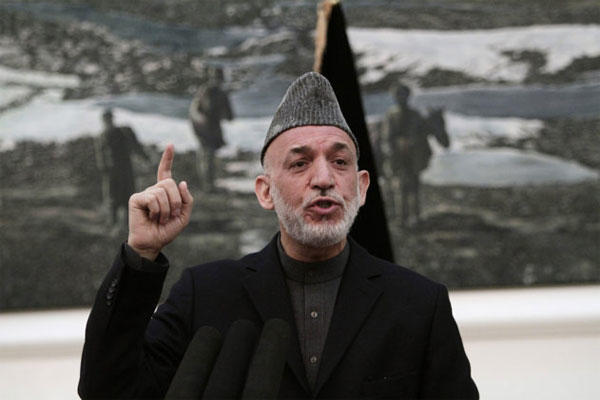Marine Gen. Joseph Dunford has telephoned Afghan President Hamid Karzai to apologize for a drone strike that killed at least one child in the latest incident threatening the U.S. plan to keep troops in Afghanistan past 2014, coalition officials said Friday.
Dunford, commander of U.S. and allied forces in Afghanistan, "expressed deep regret" in the Thursday night phone call over the airstrike targeting a suspected Taliban commander that also killed a child and wounded two women, the International Security Assistance Force said in a statement.
The statement added that ISAF "deeply regrets any civilian causalities caused by this airstrke yesterday. ISAF is committed to ensuring that all measures are taken to prevent civilian causalities."
However, the ISAF account of the incident differed with that of Karzai, who claimed that the strike by an unmanned aerial vehicle hit an Afghan home in southwestern Helmand province. ISAF said the airstrike targeted a Taliban suspect on a motorcycle, and the civilian casualties were bystanders on a road.
Karzai charged that the child's death was an example of ISAF's indifference to Afghan casualties that bolstered his decision to hold off on approving a new Bilateral Security Agreement that would allow an advisory force of several thousand U.S. troops to stay in Afghanistan at the end of 2014, when all U.S. and allied combat troops are expected to withdraw.
Karzai said the airstrike "shows that American forces are not respecting the life and safety of Afghan people's houses. For years, our innocent people have become victims of the war under the name of terrorism, and they have had no safety in their homes."
A loya jirga meeting of tribal elders and politicians earlier this week urged Karzai to sign a new BSA with the U.S. However, Karzai balked, saying there would be no agreement if such "oppressions by foreign forces continue."
Karzai suggested that he might leave the agreement to a new BSA to a new president to be elected in April, but White House National Security Adviser Susan Rice told him earlier this week that a delay could force the U.S. to exercise the so-called "zero option," meaning that the U.S. would remove all troops from Afghanistan at the end of 2014.
In a statement after the meeting in Kabul, a spokesman for Karzai said Rice had been told: "Madame Rice, the ball is in your court. The president (Karzai) said ‘If you are under the impression the (agreement) will be signed without a peace process, and without a total ban on raids of Afghan homes, this is a serious miscalculation.'"
Rice responded with a warning that the clock was ticking on a new agreement, saying that Dunford needed to know by Dec. 31 whether a deal was possible to plan for a post-2014 U.S. presence.
Rice "stressed that we have concluded negotiations and that deferring the signature of the agreement until after next year's elections is not viable," the National Security Council said in a statement.
Rice also "reiterated that, without a prompt signature, the U.S. would have no choice but to initiate planning for a post-2014 future in which there would be no U.S. or NATO troop presence in Afghanistan," the statement said.
With or without an agreement, U.S. troops were prepared to carry out their missions through 2014, a U.S. field commander said.
In a Thanksgiving Day video conference from Afghanistan, Army Maj. Gen. James McConville said that "when the decisions are made on what the numbers (of troops) are, we'll be able to execute that."
"We're going to train you for uncertainty. I got some extraordinary soldiers here, so when I call an audible, they're going to be able to execute that," said McConville, commander of Regional Command-Southeast, which includes 14 provinces around Kabul extending to the Pakistan border.
In the video conference carried by C-SPAN, McConville, who also commands the 101st Airborne Division, said the confusion coming out of Kabul meant that "I don't know yet what the size of the force will look like."
"We don't want to keep troops here any longer than they're required or as we're directed," he said.
Currently, about 47,000 U.S. troops remain in Afghanistan, and that number is expected to be reduced to 34,000 in February in line with the overall plan to have all combat forces out at the end of 2014.
McConville said that the number of U.S. troops in Regional Command-Southeast had already been reduced from 18,000 to 8,000, and the number of bases from 58 to 13.
McConville said he understood Karzai's concerns about raids that enter Afghan homes in search of Taliban suspects and "we see ourselves in a position where we don't have to do those things. As our forces reduce, the Afghan National Security Forces will be responsible for those types of operations."
McConville stressed that he was a tactical commander and the decision on a post-2014 U.S. presence would be made by others, but his own feeling was that "the Afghans want us to stay. That's the feedback that I get from most of the folks I talk to," McConville said.





























